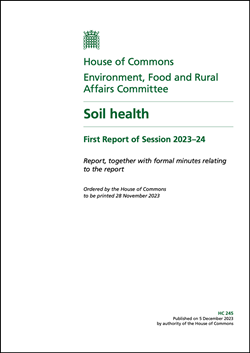By Henrietta Appleton, Policy Officer England
 The GWCT is delighted that the headline of the EFRA report following its soil health inquiry is that government should take soil health as seriously as it does our other critical assets of water and air.
The GWCT is delighted that the headline of the EFRA report following its soil health inquiry is that government should take soil health as seriously as it does our other critical assets of water and air.
The risk to food production and climate change resilience that soil degradation poses has been recognised by many farmers. EFRA ran a survey of 189 farmers alongside its inquiry, which demonstrated that the vast majority had made changes to their farming system in order to improve soil health. Of the changes made, 79% had changed their cultivation practices whilst 57% had introduced cover crops and 45% introduced alternative crop rotations.
The GWCT’s Allerton Project has been instrumental in researching the benefits of such actions on soil health and has put many of these findings into practice, whilst also disseminating the outcomes of our research and experience to farmer and agronomist groups. It is therefore interesting that the report highlighted the need for better guidance and training, and the value of peer-to-peer knowledge exchange, such as offered at Allerton, to developing sustainable soil management practices.
The report also included in its recommendations a number of actions that we have been calling for, including the need to define what is meant by “sustainable management” (is the government’s main soil target of bringing 60% of agricultural soil under this by 2030 aimed at purely the environmental aspect, or is it aimed at combining this with the business of food production?) and the development of soil health indicators so that progress in achieving targets can be tracked and measures adopted evaluated.
In our response to this inquiry, we expressed concern that the risk to soil health from the time lost trying to achieve the perfect soil metric is greater than the risk of adopting a simple metric that perhaps does not address all the factors involved in soil health. A concern reflected in this report, which states in the summary that “immediate action is hampered by a lack of agreed soil health indicators”. We called for a distinction between scientific analysis and ‘benchmark’ metrics that can give farmers and land managers site-specific guidance. It is interesting that the farmer survey accompanying the inquiry demonstrated that the vast majority of farmers, when measuring soil health, look at three factors: basic nutrients (84%), soil organic matter (83%) and soil structure (71%).
The clear message from the report was that more needed to be done if soil health was to be effectively addressed. The lack of leadership and focus on soil health in policy, which we felt was evident when the promise of a Soil Health Action Plan for England was ‘downgraded’ to arguably weaker targets within the Environmental Improvement Plan 2023, remains a concern, which the land use framework (due by the end of this year) could potentially (partly) address by rewarding sustainable decision making.
But the bottom line is that any target set for soil health needs to be embraced by farmers and land managers. It is, therefore, vital that ELMS incorporates the necessary actions with associated payment rates that reflect the environmental benefits delivered and upfront costs incurred so that uptake is sufficient to support policy ambition.